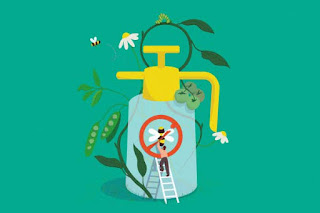Smart shifting in the use of these pesticides can make insect populations recover
World insects in trouble - if we start using pesticides to protect plants rather than killing insects can make a big difference, said Théotime Colin and Andrew B. Barron
 |
| Michelle d'Urbano. |
Insects disappear. The world has 25 percent of fewer terrestrial insects now than in 1990. This includes we rely on to pollinate our plants and clean our river. If we don't overcome this problem immediately, some species will disappear.
There are many causes of decreasing insects, but insecticides are the main part of the problem. Those used are currently more durable and up to 10,000 times more toxic than some of which are banned in the 1970s. Adding problems is that this pesticide is now applied to prophylactic plants and used whether pests are present or not.
Overall, the number of pesticides applied to the soil decreases, but this is very misleading statistics. A recent paper found that, between 2005 and 2015, there was a reduction of 40 percent in the number of pesticides applied to severely measured plants. But because modern insecticides are far more toxic, global toxicity of land processed to pollinate insects has more than double in the same period (science, doi.org/f5vp).
The government and regulator agents are aware of the problem, and some parts of the world have moved to ban the use of certain insecticides outdoors in an effort to help bees survive. But the pesticides used instead are equally toxic.
One approach that is often mentioned is to use a pesticide-free pest control method. This varied technique is collected with the name of integrated pest management (HDI) and has existed for decades. They offer effective plant protection and enter methods such as plant rotation and natural predator use. But their adoption has been very slow, because spraying pesticides is seen as an easier choice. As a result, the HDM method is unfortunately rarely used today.
There is no change in insecticide or shifting to the HDI is a quick repair. We argue instead that we need subtle changes in focus, far from killing pests and towards protecting plants.
At present, the product is developed and marketed to immediately kill pest insects. This has become the purpose of plant care, and insect mortality is considered evidence that treatment work. But the true purpose of using pesticides is not to remove insects, it is only to protect plants to secure food production.
We have found that only using the concentration fraction applied today stop insects that feed plants. At concentrations that are reduced, there will be a much less leaching insecticide into the environment, so fewer damage to useful insects. This low dose is equivalent to an anti-mosquito spray: it expels mosquitoes so they don't bite you. Do mosquitoes live or not, no problem, well you have received protection.
Likewise, we do not need to kill all pest insects in plants: we only need to reduce enough populations to ensure that it does not cause important economic damage. Farmers know that a handful of insects don't cause problems, it is when they reproduce the problem coming. We have found that very few insecticides are needed to prevent insects from reproduction than needed to kill them.
We have also found that plants are accidentally treated too much. Often, they were first treated with fungicides who were also toxic to insects. Treat them again with insecticides like killing one bird with two stones.
By using a minimum dose we need to protect plants, we can reduce the number of insecticides to a small part of what is used today. Farmers will benefit from this change. They will spend less money for pesticides and increase plant production by keeping healthy polins insects.
Reducing insecticide doses will not solve the problem of decreasing insects, but are steps that can win us time to make food production more sustainable and reconcile the agricultural land and the natural ecosystems that we submit. And it will allow insects to recover.


Comments
Post a Comment